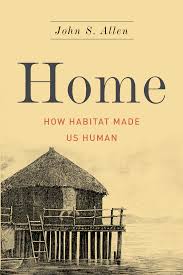
At home in the world
The other day — in a library — I briefly looked at a book. And thought, ‘another one I’ll not have time to read.’ But I gave it a quick peruse.

John S. Allen’s Home: How Habitat Made Us Human is a science essay book which goes over common ground to reframe some assumptions or two that we have in regard to our evolution. It doing so it is a countering book. It's a 'that-changes-everything' book that publishers have greatly loved over the last two decades in non-fiction. Here is the blurb:
"Home is where the heart is. Security, comfort, even love, are all feelings that are centered on the humble abode. But what if there is more to the feeling of being at home? Neuroanthropologist John S. Allen believes that the human habitat is one of the most important products of human cognitive, technological, and cultural evolution over the past two million years. In Home, Allen argues that to "feel at home" is more than just an expression, but reflects a deep-seated cognitive basis for the human desire to have, use, and enjoy a place of one's own. Allen addresses the very basic question: How did a place to sleep become a home? Within human evolution, he ranks house and home as a signature development of our species, as it emerged alongside cooperative hunting, language, and other critical aspects of humanity. Many animals burrow, making permanent home bases, but primates, generally speaking, do not: most wander, making nests at night wherever they might find themselves. This is often in home territory, but it isn't quite home. Our hominid ancestors were wanderers, too-so how did we, over the past several million years, find our way home? To tell that story Allen will take us through evolutionary anthropology, neuroscience, the study of emotion, and modern sociology. He examines the home from the inside (of our heads) out: homes are built with our brains as much as with our hands and tools. Allen argues that the thing that may have been most critical in our evolution is not the physical aspect of a home, but developing a feeling of defining, creating, and being in a home, whatever its physical form. The result was an environment, relatively secure against whatever horrors lurked outside, that enabled the expensive but creative human mind to reach its full flowering. Today, with the threat of homelessness, child foster-care, and foreclosure, this idea of having a home is more powerful than ever. In a clear and accessible writing style, Allen sheds light on the deep, cognitive sources of the pleasures of having a home, the evolution of those behaviors, and why the deep reasons why they matter. Home is the story about how humans evolved to create a space not only for shelter, but also for nurturing creativity, innovation, and culture-and why "feeling at home" is a fundamental aspect of the human condition. "-- "Home is where the heart is. Security, comfort, even love, are all feelings that are centered on the humble abode. But what if there is more to the feeling of being at home? Neuroanthropologist John S. Allen believes that the human habitat is one of the most important products of human cognitive, technological, and cultural evolution over the past two million years. In Home, Allen argues that to "feel at home" is more than just an expression, but reflects a deep-seated cognitive basis for the human desire to have, use, and enjoy a place of one's own"
The blurb overstates the physicality of a house, or burrow as home, and loses what Allen emphasises in how it is that we develop 'a feeling of defining, creating, and being in a home, whatever its physical form.’ But I guess that's why we buy the book.
For humans it the hearth, or what we latterly call a campfire, that is the home humans built their social networks around, as we evolved, most importantly, to include both kith and kin. What made a hearth a home was our ability to have meetings. In sharing a meal we can plan tomorrow’s work and play.
The world is completely made up. By us. It does not exist without us.
The world is the home of our homes.
(hearth/hearth/meals-with-kin&-kith/meetings)
The world is our empathy for the other peoples' homes.
The world is the home for all homes.
At home in the world everyone can find a place.
Allen, John S. Home: How Habitat Made Us Human. New York, NY: Basic Books, 2015.978-0-465-03899-2 Small follow up at Sydney or the Bush
